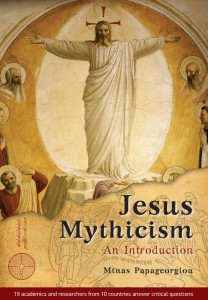 Minas Papageorgiou, freelance journalist, managing director of a Greek publishing group and a founding member of the Hellenic Society of Metaphysics (metafysiko.gr), has made his Greek language survey of a wide range of contemporary Jesus mythicist views available in English as an ebook on Amazon. And it’s not exorbitantly priced, either.
Minas Papageorgiou, freelance journalist, managing director of a Greek publishing group and a founding member of the Hellenic Society of Metaphysics (metafysiko.gr), has made his Greek language survey of a wide range of contemporary Jesus mythicist views available in English as an ebook on Amazon. And it’s not exorbitantly priced, either.
Jesus Mythicism: An Introduction was originally written for readers in the religiously conservative nation of Greece where the very existence of the mythicist debate has scarcely registered, both historically and today. The book is an attempt to introduce Greeks to a wide range of Jesus mythicist ideas currently being published and discussed in the English speaking world and now that it is available in English it is also an interesting introduction for English speakers.
Before the main interviews Papageorgiou covers some of the more general or foundational arguments of mythicists such as those addressing the earliest references to Christianity in the non-Christian sources. He segues from this discussion into details of René Salm‘s arguments about the archaeological evidence for the inhabitation of Nazareth in the early first century, Raglan’s list of “hero archetypes” found among mythological figures, and material such as supposed ancient correspondence about Jesus that has been long understood to be forgeries. Some of this was new to me.
The first interview is with Gerd Lüdemann, the scholar who suffered professionally for publishing a work calling into question the authenticity of many of the sayings of Jesus. Lüdermann also expresses his views on the Christ Myth hypothesis, too. (Hint: I’ve updated the Who’s Who list of mythicists and mythicist agnostics/sympathizers.)
While I have been interested in a few Jesus myth arguments (in particular Brodie’s, Carrier’s, Doherty’s) and have known something of a tiny handful of others (e.g. Atwill’s, Murdock’s), there are others I knew about only vaguely or not at all.
Minas Papageorgiou from the start seeks to reassure readers that mythicism is not opposed to spirituality or faith but that it even has the potential to “enhance the essential messages of faith” by separating myth from historical truth. He points out that the first “Jesus mythicists” appeared with the emergence of the Enlightenment in the eighteenth century but that this intellectual movement largely bypassed Greece. Only two groups, he writes, have anything to fear from mythicism: members of organized clergy and some of the academic guild who have made their reputations and livings through supporting the traditional Christian narrative.
This publication is not a critical evaluation of the various mythicist ideas but leaves the reader to judge and follow up what he or she personally prefers. The result is that some readers with a more serious scholarly interest may be dismayed to see the views of Carrier and Atwill given much the same billing. Carrier has criticized Atwill’s approach as decidedly unscholarly and fallacious and the two are scarcely comparable in terms of intellectual rigour. However, it is good to see Papageorgiou has given his interview with Richard Carrier priority.
In his introduction to Richard Carrier he writes: Continue reading “Jesus Mythicism: An Introduction by Minas Papageorgiou”
